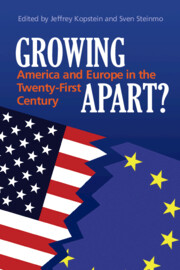Book contents
- Frontmatter
- Contents
- Contributors
- Acknowledgments
- Growing Apart?
- Introduction: Growing Apart? America and Europe in the Twenty-First Century
- 1 The Religious Divide: Why Religion Seems to Be Thriving in the United States and Waning in Europe
- 2 Value Change in Europe and North America: Convergence or Something Else?
- 3 On Different Planets: News Media in the United States and Europe
- 4 One Ring to Bind Them All: American Power and Neoliberal Capitalism
- 5 Spreading the Word: The Diffusion of American Conservatism in Europe and Beyond
- 6 Work, Welfare, and Wanderlust: Immigration and Integration in Europe and North America
- 7 Lost in Translation: The Transatlantic Divide over Diplomacy
- 8 The Atlantic Divide in Historical Perspective: A View from Europe
- Index
7 - Lost in Translation: The Transatlantic Divide over Diplomacy
Published online by Cambridge University Press: 19 January 2010
- Frontmatter
- Contents
- Contributors
- Acknowledgments
- Growing Apart?
- Introduction: Growing Apart? America and Europe in the Twenty-First Century
- 1 The Religious Divide: Why Religion Seems to Be Thriving in the United States and Waning in Europe
- 2 Value Change in Europe and North America: Convergence or Something Else?
- 3 On Different Planets: News Media in the United States and Europe
- 4 One Ring to Bind Them All: American Power and Neoliberal Capitalism
- 5 Spreading the Word: The Diffusion of American Conservatism in Europe and Beyond
- 6 Work, Welfare, and Wanderlust: Immigration and Integration in Europe and North America
- 7 Lost in Translation: The Transatlantic Divide over Diplomacy
- 8 The Atlantic Divide in Historical Perspective: A View from Europe
- Index
Summary
Introduction
Asserting that Americans and Europeans have had different diplomatic styles since the turn of the century would be one of the easier calls in current affairs. As Robert Kagan famously put it, “on major strategic and international questions today, Americans are from Mars and Europeans are from Venus.” Since George W. Bush came into office, the United States has rejected or stalled a plethora of international treaties, organizations, and understandings. In 2002, a Pew Global Attitudes survey found that pluralities in most of the nations surveyed complained about American unilateralism – and those attitudes have only hardened over time. Richard Haass, Bush's first director of policy planning at the State Department, made it clear that unilateralism has been a significant component of Bush's foreign policy. At the same time, the European Union has grown more assertive in calling for law-based forms of global governance, all the while expanding its own membership beyond the northwest portion of the continent. On issues ranging from nonproliferation to war crimes to genetically modified foods to competition policy, the EU and its member states have relentlessly pushed for the principle of multilateralism to regulate world affairs.
Wrapped up in this transatlantic divide is the general perception that the Bush administration has diverged from prior administrations in both foreign policy substance and style. On the substantive side, the United States appears to be walking away from international institutions of its own creation in order to pursue the foreign policy aims set forth in Bush's September 2002 National Security Strategy (NSS), the March 2006 follow-up NSS, and his second inaugural address.
- Type
- Chapter
- Information
- Growing Apart?America and Europe in the 21st Century, pp. 192 - 210Publisher: Cambridge University PressPrint publication year: 2007
- 1
- Cited by



